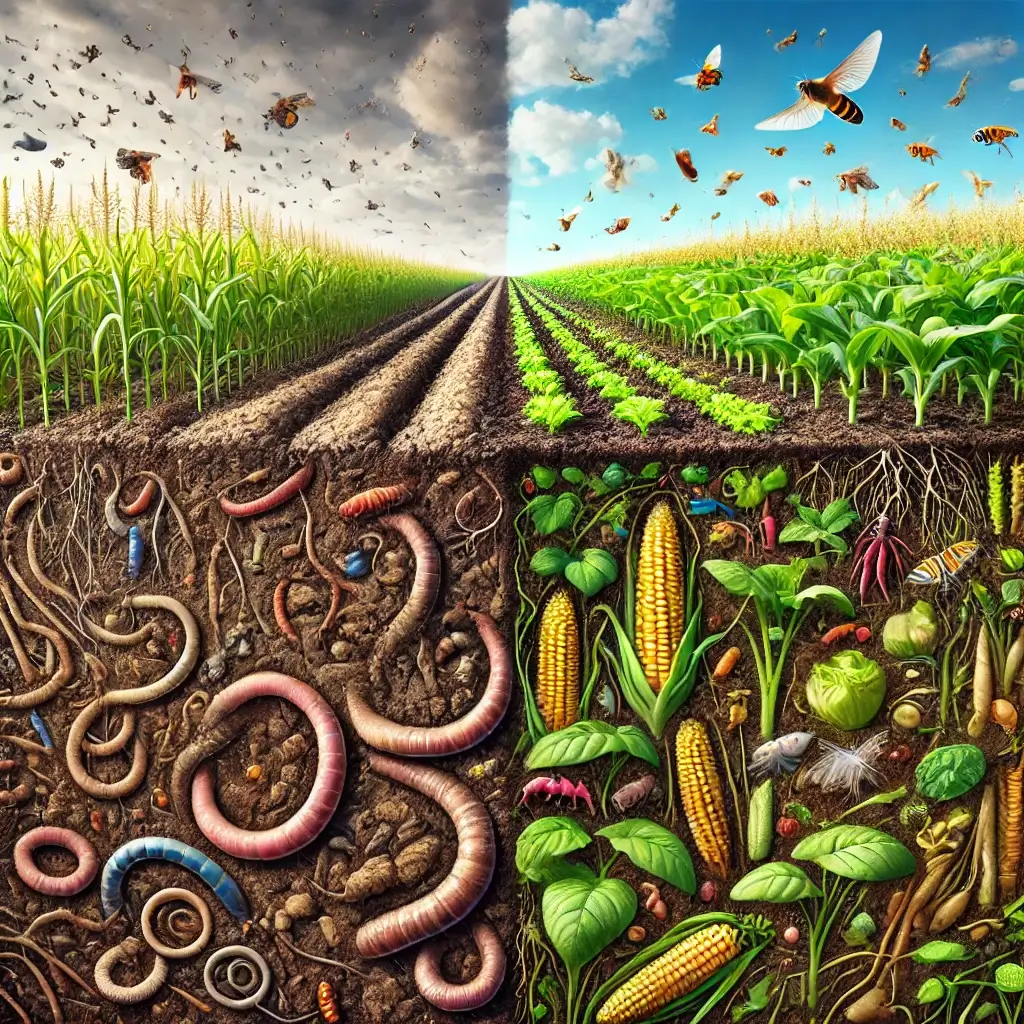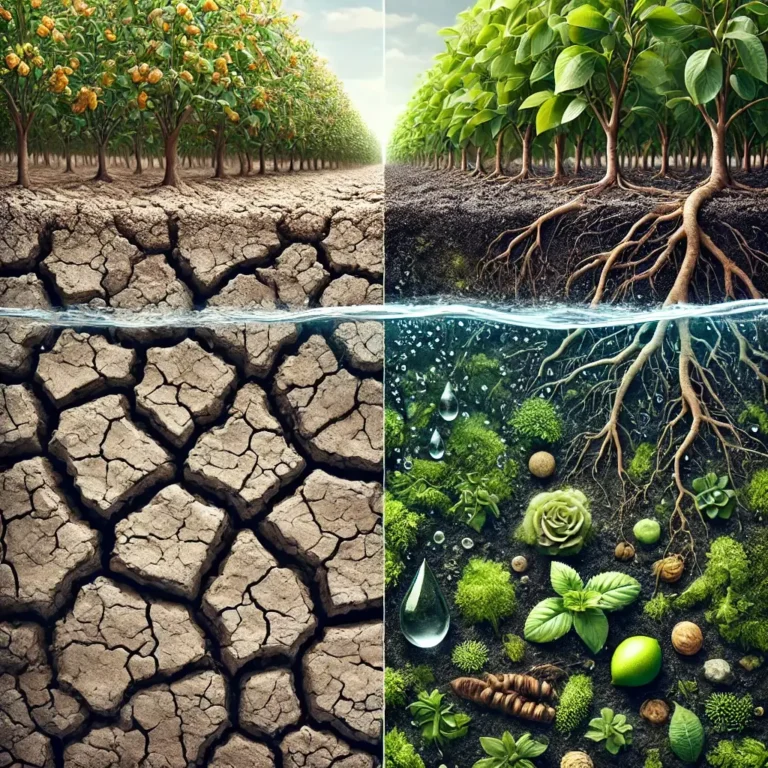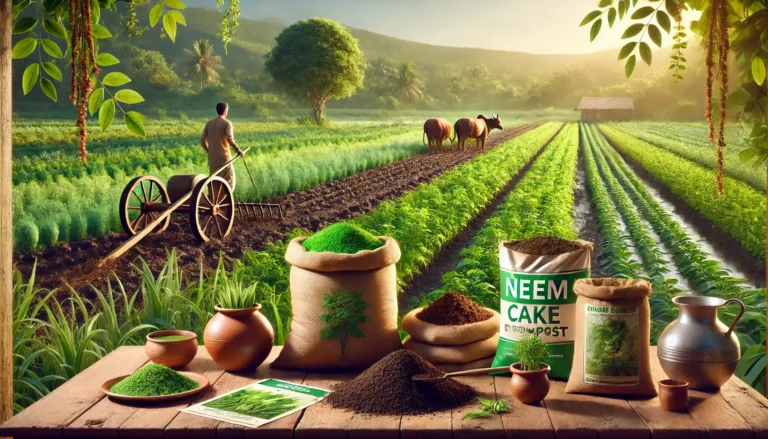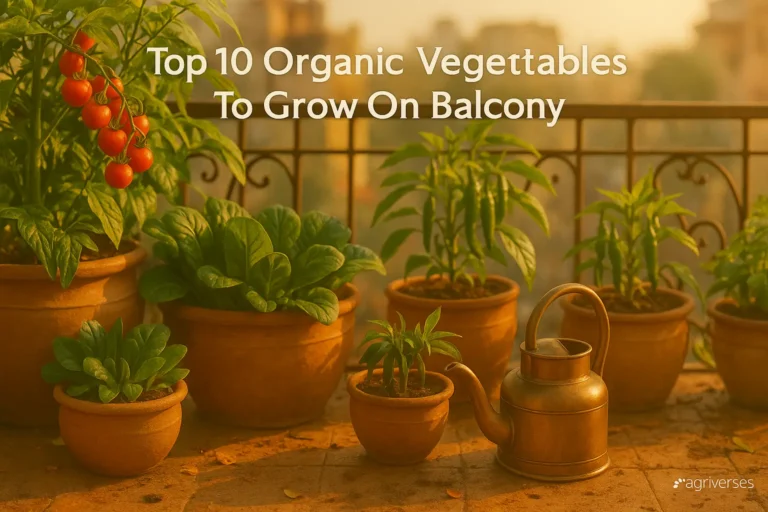Introduction: Soil Health is the Heart of Farming
Remember when farmers could tell if their soil was healthy just by its smell? That deep, earthy scent meant the land was full of life—teeming with nutrients, earthworms, and beneficial microbes. But today, things are different. The soil feels dry, lifeless, and tired. Farmers pour in more and more chemical fertilizers, yet the land keeps struggling. What went wrong? here we will discuss about organic farming benefits for soil health.
This is not just a small problem—it is happening all over the world. Weak soil means weak crops, poor water retention( water holding capacity), and lower yields. If we do not fix this, farming itself could be at risk. But do not worry, there is a natural way to bring soil back to life!
Organic Farming: A Natural Solution to Restore Soil

The secret? Organic farming. It is not some passing trend—it is a time-tested, science-backed way to heal the land. By using natural fertilizers, compost, and crop rotation, farmers can rebuild their soil, making it richer, more resilient, and productive for generations to come.
In this article, we will dive into the real organic farming benefits—keeping things simple and practical. Whether you are a seasoned farmer or just curious about Organic farming, you will learn how organic methods can make a lasting difference. Let’s get started!
The Impact of Chemical Farming on Soil
For decades, farmers have used synthetic fertilizers and pesticides to increase crop yields. While this approach provides short-term organic farming benefits, it causes long-term damage to soil health. Over time, chemical farming reduces soil fertility, kills beneficial microbes, and leads to poor crop sustainability.
Major Problems with Chemical Farming:
- Loss of Beneficial Microbes: Healthy soil is alive, filled with beneficial bacteria, fungi, and earthworms. These microorganisms help break down organic matter, release essential nutrients, and protect plants from diseases.
- Soil Compaction & Poor Aeration: Chemical farming reduces soil porosity, making it hard and compact. Without proper aeration, plant roots struggle to grow, and water drainage becomes inefficient.
- Scientific Explanation: Synthetic fertilizers contain high levels of salts, which cause soil particles to bind tightly together. This reduces air spaces in the soil, preventing root expansion and microbial activity.
- Decreased Organic Matter: Organic matter is the soul of healthy soil. It retains moisture, provides nutrients, and improves soil structure. Chemical fertilizers speed up organic matter decomposition, making the soil nutrient-deficient over time.
Organic Farming benefits (revives Soil Health)

1. Organic Farming Improves Soil Structure (Say Goodbye to Hard Soil!)
Chemical farming gives quick results, but over time, it strips the soil of organic matter, the natural glue that keeps it soft, aerated, and full of life.
According to a 2022 report by ICAR, prolonged use of synthetic fertilizers and pesticides depletes soil structure, reducing porosity by up to 30%. This leads to:
❌ Soil compaction – Hardening the topsoil, making it difficult for roots to grow deep.
❌ Water runoff instead of absorption – Causing nutrient leaching and erosion.
❌ Loss of beneficial microbes – Killing earthworms and essential soil bacteria.
❌ Nutrient imbalance – Overuse of urea and DAP leads to nitrogen toxicity and phosphorus lockout.
How Organic Farming Restores Soil Health
The good news? You can reverse this damage by bringing back organic matter through compost, manure, and natural soil-building practices.
1. Compost & Manure Make Soil Softer
Adding compost, cow dung, and crop residues binds soil particles together, improving its texture and aeration. Unlike chemical fertilizers, which degrade soil over time, organic matter increases porosity by 25-30%, making the soil looser and more fertile (ICAR, 2022).
📌 Real Example: A farmer in Maharashtra switched from synthetic fertilizers to cow dung compost. Within two seasons:
✔ His soil became softer and easier to plough.
✔ Water retention improved by 35%, cutting down irrigation costs (NABARD, 2021).
✔ His crops showed 18% better growth without chemical inputs.
2. Earthworms: Nature’s Ploughmen
Ever noticed how organic soil is full of earthworms? That’s because they love rich, chemical-free environments! These little workers dig tunnels, allowing air and water to move freely through the soil. One acre of healthy farmland can have up to 1.5 million earthworms, naturally loosening the ground (FAO Soil Biology Report, 2021).
3. Cover Crops & Mulching Prevent Soil Cracking
Leaving soil bare makes it dry out and crack under the sun. Cover crops like legumes, mustard, and clover protect the soil from extreme temperatures, while mulching with dried leaves or straw helps the soil retain 70% more moisture (FAO, 2021).
📌 Interesting Fact: According to NABARD, farms using cover crops experience 40% better water retention, reducing irrigation needs.
The Future of Soil Health is Organic
If your soil feels hard, dry, and lifeless, it’s time to rebuild its natural fertility. Organic farming isn’t just about avoiding chemicals—it’s about working with nature to create soft, nutrient-rich, and high-yielding soil.
Instead of fighting your soil, let nature do the hard work for you! let’s discuss more organic farming benefits for soil.
Authentic Sources:
ICAR Soil Health Report, 2022 – https://icar.org.in
NABARD Organic Farming Case Study, 2021 – https://www.nabard.org
FAO Soil Biology Report, 2021 – https://www.fao.org
2. Water Retention Increases (Struggling with Water Shortage? Here’s the Solution!)

Water is one of the biggest challenges for farmers, especially in drought-prone regions. But what if I told you that just 1% increase in organic matter can help soil store up to 20,000 gallons (75,000 liters) of water per acre? That’s the power of organic farming!
Organic soil acts like a sponge—it soaks up rainwater when it is available and releases it gradually to plant roots during dry periods. This means less irrigation, healthier crops, and better yields—even in water-scarce areas!
Why Does Organic Farming Improve Water Retention?
It all comes down to soil structure and organic matter. Let’s break it down scientifically.
1. Organic Matter Improves Soil Porosity
Think of organic matter as the “glue” that holds soil particles together while creating tiny air pockets. These air pockets increase soil porosity, allowing water to seep in instead of running off.
📌 Scientific Insight:
A study by ICAR (2022) found that organically farmed soil has 30% better water infiltration than chemically treated soil, reducing runoff and soil erosion.
2. Soil Microbes Create Natural Water Pathways
Organic soil is alive with billions of beneficial microbes, fungi, and earthworms. These tiny workers break down organic matter, releasing sticky compounds that bind soil particles together while forming tiny channels. These channels act like mini water reservoirs, allowing soil to absorb and hold more moisture.
📌 Fact: According to FAO (2021), soils rich in organic matter can hold up to 10 times their weight in water!
3. Mulching Reduces Evaporation Losses
Mulching—using dried leaves, crop residues, or straw—acts as a protective blanket for the soil. It reduces moisture loss due to evaporation and keeps soil temperature stable, preventing it from drying out too quickly.
📌 Real-Life Example:
Farmers in Rajasthan adopted organic mulching with crop residues. The results?
✔ 40% increase in moisture retention (NABARD, 2021)
✔ 30% reduction in irrigation needs
✔ Crops stayed green even in dry months!
4. Compost Boosts Water-Holding Capacity
Compost-rich soil can absorb and retain up to 20 times more water than depleted, chemical-ridden soil. This is because compost creates humus, a dark, spongy material that stores water and nutrients for plants.
The Bottom Line: More Organic Matter = More Water for Your Crops!
If you’re struggling with low rainfall, frequent droughts, or excessive irrigation costs, switching to organic farming can help your soil become more water-efficient naturally. Instead of losing precious water to runoff or evaporation.which help to increse thie organic farming benefits.
Authentic Sources:
📌 ICAR Soil Health Report, 2022 – https://icar.org.in
📌 FAO Soil & Water Conservation Report, 2021 – https://www.fao.org
📌 NABARD Drought Farming Study, 2021 – https://www.nabard.org
3. Natural Fertility: Say Goodbye to Costly Chemical Fertilizers!
Chemical fertilizers may give a quick nutrient boost, but over time, they strip the soil of its natural fertility, making farmers dependent on artificial inputs. Organic farming, on the other hand, rebuilds soil health, allowing it to generate nutrients naturally—just like a self-sustaining ecosystem!
Why Does Organic Soil Stay Naturally Fertile?
1. Nitrogen Fixation: Free Fertilizer from the Air!
Did you know that 78% of the air we breathe is nitrogen? But plants can’t use this nitrogen directly—they need microbes to convert it into a usable form. Leguminous crops (like pulses, beans, and peas) contain rhizobia bacteria in their roots, which naturally fix nitrogen from the air into the soil—reducing the need for synthetic nitrogen fertilizers.this help to increase organic farming benefits.
📌 Example:
A study by ICAR (2022) found that farmers who planted legumes between crops increased soil nitrogen levels by 40%, reducing their fertilizer expenses by nearly half!
2. Compost & Manure: Nature’s Perfect Fertilizer
Organic farming recycles nutrients back into the soil through composting. Decomposed cow dung, poultry manure, and crop residues release essential nutrients like Nitrogen (N), Phosphorus (P), and Potassium (K), mimicking the way nature replenishes soil in forests.
📌 Fact:
A Cornell University study (2020) showed that compost increases soil organic carbon by up to 45%, leading to better nutrient retention and healthier crops.
4. The Hidden Workforce in Soil—Microorganisms!
Did you know? There is a hidden workforce inside the soil—bacteria, fungi, and earthworms—working 24/7! Chemicals kill this workforce, but organic farming makes it stronger.
📌 Example: FAO research shows that organic soil contains 200-300% more microbial biomass, which helps in natural fertilization.
1. Soil Microbes: The Hidden Workforce of Your Farm
Think of soil microbes as tiny factory workers that break down organic matter and convert it into nutrients for plants. Unlike chemical fertilizers, which provide nutrients in one big burst (leading to excess runoff and soil degradation), microbes release nutrients slowly and steadily, ensuring long-term soil fertility.
📌 Scientific Insight:
According to NABARD (2021), organically farmed soils contain 20-30% more beneficial microbes, leading to higher nitrogen fixation and better nutrient availability.
2. Earthworms: The Natural Soil Engineers
Ever noticed how healthy, organic soil is full of earthworms? These little creatures aerate the soil, break down organic matter, and release nutrient-rich castings (worm manure)—a powerful natural fertilizer!
📌 Real-Life Example:
Farmers in Punjab who switched to vermicomposting saw a 30% increase in soil fertility and cut down their chemical fertilizer costs by 60%! (Source: NABARD, 2021)
What role do microorganisms play?
- Decompose organic matter, releasing essential nutrients.
- Improve soil structure by producing natural glues that bind soil particles. this also enhance the organic farming benefits.
5. No More Toxic Soil (Eliminating Pesticide Side Effects!)
Chemical fertilizers and pesticides leave behind toxic residues, which gradually destroy soil fertility. Organic farming provides a natural solution, using neem-based pesticides and biofertilizers.This also help to increase the organic farming benefits.This also p;ay a crucial role to expand the organic farming benefits.
6. Reduced Soil Erosion!
If your soil has become loose and washes away with rain, organic farming can be a game-changer!
📌 Example: Farmers in Himachal Pradesh used organic mulching and reduced topsoil erosion by 50%!
How does organic farming prevent soil erosion?
- Cover crops protect soil from heavy rain.
- Organic mulch keeps soil moist and stable.
- Strong root systems hold soil together, preventing washout.
7. The Natural Magic of Earthworms!
Earthworms are nature’s best ploughs! They aerate the soil, improve drainage, and leave behind nutrient-rich castings.
📌 Example: According to ICAR research, organic farms have 200-400% more earthworms, making soil more productive!
8. Carbon Sequestration: A Natural Solution to Climate Change
Organic farming locks carbon into the soil, helping to reduce global warming. Studies show that organically farmed soils have 20-30% more carbon, which improves climate resilience.
📌 Example: IFOAM studies confirm that carbon-rich soil protects crops from extreme weather!
9. Cost Savings for Farmers
Yes! Organic farming requires patience, but in the long run, it can reduce your fertilizer and pesticide costs by up to 50%! which help to increse organic farming benefits.
📌 Example: A farmer in Madhya Pradesh saved ₹15,000 per acre by switching to organic fertilizers!
10. Government Schemes & Support
Good news! The government is actively promoting organic farming through various schemes: This ensure increase the organic farming benefits.
- Paramparagat Krishi Vikas Yojana (PKVY) – ₹50,000/ha for organic farming.
- Rashtriya Krishi Vikas Yojana (RKVY) – Incentives for organic transition.
- NABARD Organic Farming Subsidy – Financial aid for organic methods.
📌 Example: Sikkim became 100% organic with government support! 🚀
Conclusion: What Do You Think?
for enhance the organic farming benefits and if you want to keep your soil healthy, fertile, and productive, organic farming is the best option!
🌱 What are your thoughts? Do you support organic farming also if you know more about organic farming benefits Comment below!
📢 Share this article and spread awareness about organic farming!
❓ Frequently Asked Questions (FAQ)
1. What are the main organic farming benefits for soil health?
Organic farming improves soil structure, increases water retention, enhances natural fertility, and supports beneficial microorganisms.
2. How does organic matter improve soil health?
It enriches soil with essential nutrients, enhances microbial activity, and improves water retention.
3. Is organic farming cost-effective?
Yes! While initial costs may be high, long-term savings on fertilizers and pesticides make it more economical.







This is nice post